#even in those cases. people will relate to it who AREN'T part of the identities the creator conceived
Explore tagged Tumblr posts
Note
my locked tomb hot take of the day is that the way Harrow’s symptoms are presented in HtN line up much more closely with religious OCD with poor insight and psychotic features than schizophrenia. She shows almost no signs of paranoia or delusions (G1deon really was trying to kill her! It’s absolutely true that the other houses would swoop in like vultures if they knew her house’s true position! Her sword and psyche were both actually haunted, to the point that Alecto could hitch a ride in her body. She is never shown in the text to hold a belief that is inconsistent with reality, IMO) and her only true psychotic symptom that we see is hallucinations, and she seems to most of the time have some idea that they aren’t real, which indicates a level of self awareness incompatible with schizophrenia. She also doesn’t seem to display many cognitive symptoms like thought block or disorganized speech and thinking. The rest of her behavior is highly obsessive (compulsive praying, wearing face paint even when nobody is around, obsessive studying, needing her food to be arranged on her plate a certain way) and is very in line with someone suffering from religious scrupulosity. As someone who has experienced both OCD and psychosis, and knows how the symptoms can overlap, this is is the hill I will die on.
I don't feel like I can contribute in any meaningful way to your points, so I'll just put this out into the world and say that I appreciate your insights!
Speaking from a #meta perspective: I know that around the time HtN came out, Tamsyn gave interviews talking about her own experiences being hospitalised for mental health reasons and implied that was what she was partly drawing on when writing HtN. I can't remember if she called Harrow schizophrenic or stated that it was her intention to write her as such, and the author is dead anyway. Plus, obviously, the fact that someone's writing was informed by irl experiences doesn't have to mean that said writing is a 1:1 parallel for those experiences, expecially in a sff setting where ghosts exists and in fact there's something that Harrow can see and nobody else can.
TO ME, the fact that people who experience psychotic episodes can recognise themselves in Harrow's internal monologue and experiences is more meaningful than whether Harrow “really” has a given specific disorder or she's just seeing ghosts. The point is that SHE feels a disconnect from reality and that she's delusional and cannot trust anything she remembers or reads. Nobody in-universe is ever going to diagnose her, you know? The series itself doesn't claim to be straight-up representation for any specific named issues — things like Cytherea's cancer or Harrow's mental state are left ambiguous and partly influenced by magic. I think the fact that readers can relate to some symptoms some characters experience is more meaningful than whether these symptoms all point to something that can be diagnosed unambiguously.
Thanks for sharing your thoughts with me!
#I hope this makes sense! I have so many thoughts about hashtag representation in books#bc I think there's no unique way to portray a specific lived experience whether it's a marginalised identity or something else#even if the creator has a clear picture of what they want their character to be#even in those cases. people will relate to it who AREN'T part of the identities the creator conceived#and some people from those groups might not relate instead#to my knowledge TM hasn't specifically said harrow is schizophrenic although I could be very very wrong#but as always I don't believe authorial intention should be used as a gotcha#but also I think different interpretations can coexist just because we all bring our own baggage to how we interpret fictional characters#ask#tlt thoughts#harrow#elle tlt posting#lmk if I should tag for something
39 notes
·
View notes
Text
OTHERHEARTED
What does it mean to be otherhearted?
Otherhearted is a term primarily used in the therian/otherkin community that means “to identify WITH a non-human animal/creature/being.” You may have a deeply rooted connection/relation to it, and experience shifts or traits similar to the species, BUT not identify AS it. For example, I experience many bear traits and shifts, I feel a deep connection to these animals and identify WITH them, rather than identifying AS them. The “as” or “with” are very important to distinguish a theriotype/kintype from an otherhearted “identity”.
Another common term that holds the same meaning is kithtype. The etymology of the word “kith” originally means familiarity (not family), or something/someone you are connected/close to. Then the word “type” refers to what kind of identity it is (which is kith in this case).
To simplify the difference between kintypes and kithtypes; kin (to identify as/to be) and kith (to identify with/to be like).
Importance of Otherhearted
In the community people tend to showcase their theriotypes over kithtypes. They are held at a higher standard, and they are viewed as more important when it comes to our identity as a whole. But that couldn't be further from the truth. In fact, being a therian and being otherhearted can share most of the same experiences. You can indeed have shifts from kithtypes, mental and phantom. Being otherhearted can impact your life just as much, and you can wear all the same gear as a therian. Both are a part of your identity. Kithtypes can be just as prominent as kintypes.
The questioning process can be all the same as well.
Belonging in the Community
People who are otherhearted are just as valid as therians, and belong in our community all the same. We all identify as, with or simply connect to animals in different ways than people who aren't in our community. Our animal hearts, minds and souls are what connects us. Not the labels. Therians, otherkin, otherhearted, coping identities/coping links… they all belong.
As I have said before, these all share similar or same experiences. Any of us can wear gear, do quads, make posts, educate or share our identities. The sole differences are the origin of these identities, and whether you identify as or with the animal/creature/being (or if it's a voluntary identity like in the case of coping links, which I will eventually address in a separate post).
Confusing the two
It’s easy to feel lost when we’re trying to figure out what we are, and where an identity stands. Is it a theriotype? Is it a kithtype? Is it a cameo? It can be quite the confusing process. Although I think that if people knew how important being otherhearted is, they might find it easier to understand if they're kith or kin. I mean, in the end the major difference is just… are you LIKE the animal? Or ARE you the animal? Shifts don't immediately mean theriotype, so I think that's where most of the confusion lies.
Quick definition of cameo for those who don’t know of them : Cameos are simply shifts that can suddenly come and go, that arent from a known kintype. They may make a brief appearance in your life. Think of the actual word “cameo” that is used for actors who make sudden appearances in movies, and may bring an element of surprise to viewers.
I am otherhearted
I have six primary kithtypes. Each has different levels of relevance/importance to me, but are still very important to who I am as a whole. These kithtypes are; Canines (coyotes and jackals especially), Kermode Bears/Black Bears, Ravens, Snakes, Giant River Otters and Arthropods as a whole. It's a lot, but over the years, deeply rooted connections to these animals have planted themselves into my identity. I have shifts, behaviours and traits just like them!
Sometimes I even feel confused because of how prominent they can become.
Well, that’s all for now! I thought it would be important to talk about otherhearted identities for a change. Its not shared enough and I think that spreading more information could help people figure out experiences more easily.
Hope you enjoyed!
Last note - If I made spelling errors or definition errors let me know. Everything is based on research, and what I've been learning throughout the years I've been in the community. I have been active here for more than 7 years, and have been on many different platforms including Instagram, Amino, Tumblr, Discord groups and a few Forums. So I don't only explore newer information, but also older ones.

#therianthropy#alterhumanity#therian things#therian#theriotype#cat therian#therian community#therians#otherkin#otherkith#otherkinity#otherhearted#kithtypes#kith
228 notes
·
View notes
Note
"Zero-sum game" anon returning. I am surprisingly capable of maintaining optimism of the will, but ONLY as long as I stay away from the news or even other people liable to be upset by it. This unfortunately includes not only everyone I care about personally, but quite a few of the larger communities committed to organizing against those who would harm them. Advice to "try to change the subject or else walk away" works mainly for the former, and in any case is much harder to do when it's your own life at stake too.
Last month, you covered a related phenomenon in an excellent musing about the dangers of conflating identity with suffering. "Everyone secretly hates me and is out to destroy me" is terrible enough as a self-concept, but as a rallying point has even more potential for harm. This is where I think an element of peer pressure comes into doomerism: If catastrophizing is part of what holds a group together, then non-participation becomes a perceived threat to unity no matter what the rationale. Never mind that I want to avoid a mental breakdown from dwelling on all the reasons bigots want me dead; plenty of loud doomer activists from multiple demographics would still declare me as evil as a bigot myself for this "crime" of wanting to turn away from our shared pain.
In theory, balanced ways must exist between obliviousness and burnout. In practice, I feel disloyal to anyone I share even the remotest crumb of kinship with for even daring to consider such a thing. And yes, I do realize now how that might be actually be part of the problem.
yeah i'm sympathetic to the whole "sometimes binging news coverage is a huge fucking bummer that drags me down" thing; and there's not actually any inherent virtue to Bearing Witness to the Horrors, especially if you find that shit demotivational. and if people want to make Bearing Witness to the Horrors, or even worse, Being Victim to the Horrors, the non-negotiable determinative element of a shared group identity, the thing you must do to prove your trust and virtue to others, run the fuck away!
people who demand you make misery central to your identity or your worldview aren't just wrong, they are dangerous. they are emotional vampires. they are interpersonal varelse. many people acquire social antibodies against that sort of thing as they mature, but not everybody, and sometimes these kinds of people will try to leverage the mechanisms of shared identity or in-group language to sink their metaphorical fangs into your metaphorical jugular. so for those people that need it, i am giving you explicit permission to tell people like that to Fuck Off. you don't need to give them the benefit of the doubt--it doesn't matter whether they do it on purpose or not. you don't need to feel sorry for them--they will feel plenty sorry for themselves. you don't need to try to help them--they do not want your help. just tell them to fuck off. then ignore them forever. you're allowed!
46 notes
·
View notes
Text
I know this will probably be a pretty niche acceptance/positivity post, but for for the people who are minorities and fetishize/sexualize that part of themselves: You aren't a "bad example" for doing so.
Being a minority can be really traumatizing, and the trauma and abuse we endure can often go overlooked or be minimized. It isn't wrong for you to react to that trauma in a way where you attempt to take control back of your identity, even if that control takes the form of a sexual coping mechanism.
Personally, me being misgendered for 4 to 5 years fucked with my head a lot, and while that doesn't sound "that bad" to most since they've never endured that type of pain, it basically meant the people around me was ignoring and denying me my identity for pretty much my entire teen life which were already fucked over by other factors.
While I won't go into too much detail, all those years of having such an integral part of me denied ( especially during such formative years of my life ) lead to me developing a forced feminization kink as a trans man.
At times it can trigger my dysphoria, I have to be careful participating in it, and do my best to not oversexualize myself too much, but either way, I'm not bad for that happening to me nor am I bad for having the kink. Similarly, you're also not bad for it, no matter what your story looks like, nor how your kink manifested.
Even without any explicit trauma like that, being a minority that's just existing can be inherently traumatizing and scary as fuck. I mean, why wouldn't it be when the world around you is hostile towards you, be it overtly or covertly, simply for existing?
While I know you can also be into this type of stuff without having trauma like this, ( which is also just as valid, ) I've just never see anyone talk about this type of stuff in the sense of it developing from trauma, so I wanted to make a post like this in case anyone out there can relate and needs to hear this.
Cuz if I'm completely honest? It's kinda lonely and isolating to go through this type of stuff, due to how taboo it is to fx. be a trans person that fetishizes themselves. People can make you feel shameful for developing a kink like this, or for simply fetishizing yourself at all, since it can make those mentioned people label you as a "bad [insert whatever minority here]"
Just remember to pace yourself, know your limits before it starts to harm your mental health, and remember that at the end of the day you're more than just a sexual object; you're a person that deserves respect, love, and acceptance.
Even if you can't do any of those things just yet for whatever reasons, I'm sure you can work towards partaking in the kink you have in a healthy way eventually. I believe in you.

#not labelling this as mdni cuz I started to go through this stuff when I was 15 and needed to hear this shit#I just ask of minors who are going through this to not actively partake in the kink in adult spaces for your own safety and mental health#proship please interact#pro fiction#profic#proship#proship community#proship safe#proshipper#profiction#pro kink#anti harassment#op is profic#op is proship#op is a proshipper#profic safe#proshipper safe
92 notes
·
View notes
Text
When my wife and I first started fucking dating, we had a shorthand phrase we would exchange when someone was being...some kind of way about gender and sex and sexuality...to sort of indicate to each other what we thought was happening.
"I see we've decided to round to the nearest dick."
See, wifey and I are both trans and bisexual in REALLY similar ways, but with different AGABs right? And we noticed with time that interesting trends showed up. For me, people, even those who know I'm bisexual, treat me like they would treat me as a straight person in their life. Wifey often gets treated like loved ones treat exclusively gay people. Then with gender it's similar! People assume I *don't* have a dick and so they treat me like they would treat [failed] women in their lives. They assume Wifey DOES have a dick and treat her like they would treat a [failed] man in their life. Even beyond that, when wifey and I are TOGETHER, we are automatically defaulted into the "straight" category or the "gay" category depending on which of us (how many of us) they are assuming has a dick, and then defers authority in the relationship to whoever they think has the dick.
It's all gender essentialism all the way down, and interrelated essentialism across the whole spectrum, butit shows up in different ways depending on how people perceive our relationship to our genetalia
And it IS about our genetalia because it almost always gets explicit about it at some point.
I think what I've always found the most interesting is how other queer and trans folks interact with the concept of rounding to the nearest dick, including how we as a community wield it against each other laterally. The experience of being called "basically a woman" by lesbian partners in order to reconcile their discomfort with my gender (as distinct from lesbian partners whose reconciliation of my gender with their sexuality involved calling THEMSELVES "basically alesbian" or some similar iteration that emphasized the importance/meaning of THEIR identity WITHOUT commenting on my own) while Wifey gets treated like "basically a man" because of how race, gender, and sexuality intersect for her. The experience of being told I am excempt from certain realities not based on ACTUAL lack of the experience but based on a feeling of ownership people believe they have over how those experiences may manifest in the world, like when someone says "well trans men aren't oppressed anymore" so I shouldn't take up space in women's communities, men's communities, OR trans-general communities. Or like when someone told wifey that gay men haven't been oppressed since same sex marriage.
Like A) you're simply fucking wrong, and B) even if you were RIGHT, I'm NOT a trans man and my wife ISN'T a gay man. So why would that mean anything about us?
Part of what we both noticed is that the function of "rounding to the nearest dick" is usually about silencing or side-lining someone. WHO exactly is relational and context dependent, but essentially it boils down to "I need one of us to be explicitly less empowered than the other of us to feel safe navigating our interaction"
Sometimes it's preferrable to BE the disempowered (e.g. justification of horizontal hostility) and others to be the disempowerING (e.g. gatekeeping access to socio-economic resources) but in either case, we explicitly see gender wielded asymmetrically and selectively to create and redirect power. Not as something intrinsic to a person or within their control. And I think it's interesting as a trans person to experience gender explicitly as power even when, for me, that's never what it's been. It's interesting to see how people engage with that power when THEY don't usually experience it that way.
Anyway, rounding to the nearest dick is something I think we should all avoid, in part because maybe we should stop focusing in so much on people's gender and sexuality having ANYTHING intrinsic/inherent to them, as opposed to a layer of context within the wholeness of their lives
28 notes
·
View notes
Note
i read an old post about fashion in the different countries and it’s explained that aesthetic isn’t really prioritized by those who live in vrithka. so do nikke and jost’s tattoos have meanings or cultural significance? (apart from the snake ones since you already mentioned that they’re a count of people they’ve killed)? and if it’s not a spoiler, would they get matching tats with the commander once they’re far enough in a romantic relationship? i hope things are well on your end!
Their arm tattoos are the ones related to the Taipan, a gang that's taken over the majority of Vrithka that they're both a part of. Those are the ones where each scale represents someone they've killed, yes.
Otherwise, the tattoos on their necks are also cultural-- they're something unique to the clan they're both part of. As one grows up, they begin to get geometric tattoos along their neck that represent parts of their life-- gender identity, life accomplishments, their role within the clan, marital status, etc, etc. The tattoos are continuously added on to throughout life, and you usually get your first one around 16, when one is considered an adult within the tribe in the sense that they're expected to help contribute to the clan.
I don't know if Nikke + Jost would get matching tattoos, though... it would depend on what it is. Tattoos have significant cultural importance to them both, so I don't think they would just get something for fun, even if it was for the Commander. Then again, within the clan, tattoos are also used to identify family units, so... if MC joined the family so-to-speak... it might be optional for MC to adopt that part of the culture, in which case they'd sort of have matching tattoos?
Otherwise, tattoos for pure aesthetic aren't really a thing in Navara-- the only exception to that is in Belleont, where pirates regularly get them just for the sake of getting them!
111 notes
·
View notes
Note
Really liked the previous abnormal psychology post, do you have anything to say about intrusive thoughts (and how people tend to misuse that term (and how they aren't only about violence because that's the only examples i have seen people talk about))
Ah but of course!
Intrusive thoughts are in this category where a lot of people use the term without really understanding the extent to which it means. People often conflate it with impulsive thoughts or fantasies, wherein a person will have an urge to do something reckless but enjoy it. This could be something like dying your hair, making a really mean comeback to that one annoying coworker, jumping in a lake, or even something more aggressive like pushing over a baby stroller. They're thoughts that people have at random but enjoy the thought of them, even if they're a little dark. Fantasies in particular can cross over into the whole desire aspect of what a person would want, which mehhh I don't really wanna get too into since this is about intrusive thoughts
Intrusive thoughts on the other hand are unwanted thoughts of any kind. They're thoughts that bring the person stress, anxiety, etc and etc. These can be anything really, but most of the time it can be anything like these
Suicidal ideation and or self harm
Being SA'd or SA'ing someone else
Homicidal or aggression towards innocents
Fear of social ostriziation
Random imagery that's just generally disturbing
Public humiliation
Philia-related (ex: SA'ing a child, animal, corpse, etc)
Mind readers or someone potentially observing your thoughts
Believing that something that happened to another was actually your fault and you're to blame for it all
Religious-related fears
Scrutinizing your identity (gender, sexuality, etc)
World-ending catastrophes
These thoughts aren't exactly a representation of who you are nor your "secret desires" like say fantasies. I want to make a distinction between that. Intrusive thoughts are disturbing and can oftentimes cause stress and anxiety
This can manifest in disorders like OCD, where to combat these intrusive thoughts (obsessions) they do these things that..don't really work (compulsions).
Here's a list of some common compulsions as well lol
Interrogation of self, like asking yourself whether you actually want to do any of those things or whether you feel rightfully repulsed by them
Checking and recounting things in case if someone had stolen anything or something bad will happen if it isn't quite right
Asking for reassurance from peers
Routines and "rituals", like how a person may have to watch a certain video in order for them to sleep
Doing somethings over and over, like washing your hand 4 times because 4 just "feels right" enough to get whatever the hell is on your hands off
Compulsions don't have to be logical or rational. Sometimes they're just stuff like "I need to flick the lights of my room on and off seventeen times or else my parents will die and go to hell". It's just whether or not it makes sense and has the person feel as though it works
Either way, intrusive thoughts are an infinitely complex topic that most people don't really wanna talk about because they're exposing. I know damn well I don't really wanna share mine. It's not really until they're less demonized and misunderstood that people can really talk about them
Intrusive thoughts make sense for why people who don't get them are reaaallly off put by them, but it's still irritating. Like I get why a well-adjusted person would be spooked by hearing that someone they care about has these thoughts, but it's still...gewhhhghhhhh y'know?
Like c'mon. Thoughts are not really indicative of a person's core. Your brain is going a mile a minute. Sometimes the train of thought just spits out the worst thing known to man and you just kinda gotta live with it knowing that it's not really you, but some subconscious part of your brain that's like "god wouldn't it be so fucked up if that happened?" It feels even more isolating honestly since not only do you feel like a freak and horrible person, but you can't really vocalize it unless it's in broad strokes and hushed tones. Ah well
Either way, intrusive thoughts and disorders connected to them are pretty complex. Again, highly recommend checking them out and researching them more if you wanna
7 notes
·
View notes
Text
It's interesting to me that understandings of transsexuality have been almost exclusively filtered through the lens of queerness and the social aspects of gender. In other words, that the "T" was added to "LGBT." I've thought for a while that in a lot of cases, transness — and specifically dysphoria — makes a lot more sense when analyzed through the lens of disability rather than through queerness. (Personally I see it as being at the intersection between those things.)
I think that a theory of transsexuality would be incomplete without taking into account the societal aspects of gender, yes, but it seems to be similarly incomplete in the popular understanding of it.
I've seen a lot of discussion in the stuff I've read by disabled people about the contention between being objectively harmed or, well, disabled, by your disability, but still wanting to be proud of it or finding identity in it regardless. A lot of autistic communities, I've noticed, talk a lot about the fact that being autistic is difficult; it's made worse by other people's reactions to it, but it still is hard on its own (e.g. auditory overstimulation); yet people still can say that they'd rather be autistic than not. Or they may say they wish they weren't, but that they've come to terms with it because it's not exactly changeable.
Point is, there's open discussion about the differences between inherent challenges to your disability regardless of society, the ways which ableism makes things more difficult, and the contention of finding identity and community in your disability despite that. (And I use autism as an example because I'm autistic; I don't want to speak for, say, a physically disabled community as I'm able-bodied. But I have seen similar discussions there as well.)
The trans community, as I've seen, doesn't really have that. We're polarized between the extremely self-hating people who think that being trans is a curse and that people who like being trans are just fakers co-opting transness, and the toxically positive contingent who refuse to engage with the fact that sometimes dysphoria really does just hurt. And also that transphobia exists.
There's also the fact that in many ways, dysphoria is actually disabling. It isn't for everyone, and part of the problem is that transness as a concept covers so many things that analyzing it through just one lens will always be incomplete, but for me at least it caused me a lot of depression and dissociation, and made it difficult-to-impossible to interact with other people or function at my classes. Back before I medically transitioned, I related a lot to some descriptions by disabled people about their chronic pain, because my dysphoria effectively was chronic psychological pain. I don't want to say it's the same thing, because obviously I've only experienced one of those things, and dysphoria has a treatment while many (all?) chronic illnesses don't, but nevertheless it was a comforting lens to think of my dysphoria through in the time before I got top surgery.
Also of note is the way both our communities are treated by the medical establishment. I've heard many horror stories by disabled people of how doctors simply refuse to diagnose them or give them issues with their meds. Trans people obviously also have to deal with the shit that doctors put out in order to get access to HRT and any necessary surgeries. People deride HRT, saying that we shouldn't take it because it'll "make you a medical patient for life." People act like mental pain isn't real — calling depression fake, acting like because things like fibromyalgia aren't "real pain" that it shouldn't bother you so much, etc. — and that extends too into the way they dismiss the pain of gender dysphoria.
So, I don't really understand why the trans community has taken so many pains to disavow themselves from being considered even remotely similar to disabled people. I know that the common refrain, "we're not mentally ill!" is meant to combat the idea that we're deluded into thinking that we're a "different gender" than we really are, but the effect is throwing actually mentally ill trans people under the bus. The insistence that there's no way that dysphoria should be considered a disorder because there's nothing wrong with us — I just think that we could take a hint or two from the way that disabled people theorize about this subject.
#trans#transgender#transsexual#o.#trans theory#disability#this post is kind of all over the place bc I have a lot of thoughts on the subject and I haven't really organized them yet#so sorry for the rant#hopefully someone who knows more about sociology and/or disability theory than I do can say whether any of this makes sense lol#I am very much not a sociologist or even close to being one#also theres a whole bunch of other ways I think the trans community could benefit from listening to disabled people that I didnt say bc thi#post is long enough#(understanding ''disabled'' as an umbrella term which covers a wide range of disparate experiences)#(high-support needs vs low-support needs and understanding that some people need more stuff (analogous to more extreme dysphoria) but that#both are affected by their disability even if they might need different things)#(people have competing access needs sometimes & that doesnt mean that either person is wrong but just that every space can't cater to every#body)#just in general I think disability theory & even just general discussions in the disabled community seems a lot more robust and in depth#than the stuff I see about trans people#I really do tend to view my transness as more of a medical condition than a social identifier so maybe that influences my thoughts on the#matter#it seems the only other people who think that way are transmedicalists and I'm not touching them with a ten foot pole. their anti-nonbinary#hatred alone makes it impossible to even consider doing so
6 notes
·
View notes
Text
Imitated DID Reloaded
(Part 1, Part 2)
After the controversies of the 80s and 90s, the publications of the imitated DID theory and the rename from MPD, DID diagnosis rates and public awareness of the disorder overall plummeted. Recently though, it's been picking up steam online, which led to a revival of the Imitated DID theory.
Clinicians identified five themes common in these cases they deemed to be imitated.
But before touching those...
An important note on methodology.

Notice the name at the front of the paper on the TADS-I, Boon, is also one of the authors of this study, and of the original Imitated DID paper.
Looking up the TADS-I immediately links to Suzette Boon's own website.
In the limitations section, it's mentioned that TADS has yet to be validated.

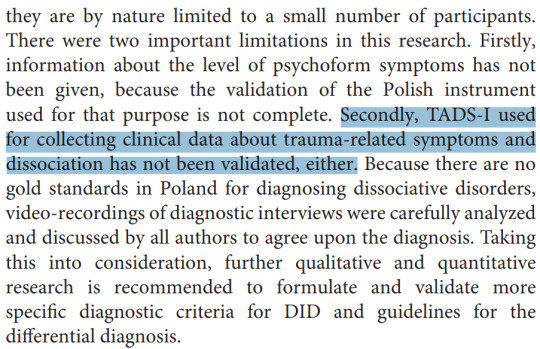
So Suzette Boon and colleagues used Suzette Boon's unvalidated interview (TADS-I) to assess patients for having a condition originally made up by Suzette Boon. (Imitated DID.)
With that note on methodology, let's dive right in and address everything wrong with the themes!
The Themes
Theme 1: Endorsement and Identification With the Diagnosis
In a modern era, it's pretty common for ordinary people to research a disorder they think they may have. Especially if a mental health professional suggests the diagnosis first, as happened in four of the six cases listed...

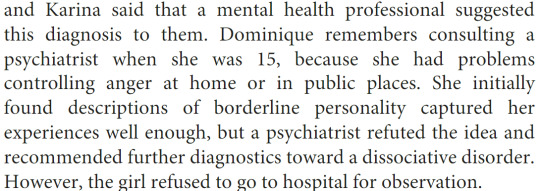
If someone says "I think you might have this disorder," MOST young people today are going to look on the internet to determine if it matches up. We literally have this ability in our pocket. Of course we'll use it.
And if you want to establish a theme like this, then you should generally have some type of control group to compare it to.
These were six people out of 85. There are no percentages given of the other 79 who had identified with the disorder beforehand. There are no statistics of how many looked it up online. It seems like it would be easy to get these sorts of stats to test their hypothesis but they aren't there.
Theme 2: Using the Notion of Dissociative Parts to Justify Identity Confusion and Conflicting Ego-States
This one is a bit harder to parse.
The idea here seems to be that people who have conflicting feelings or identity confusion will attribute that to alters.
The problem with this, similar to the first one, is that there's no comparison to actual DID groups.
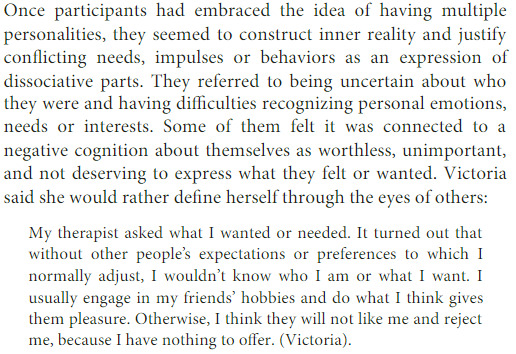
Victoria lacks a firm sense of identity. And I think it's fair to say her acting in different ways to different people probably isn't a different alter every time. But it's possible and common to experience a lack of identity like this, while also having a complex dissociative disorder.
I can't assess whether she has DID or OSDD, but I don't think experiences like this are indicative of her not having it, and I know many DID systems would relate to her not having much of an identity.
2.1: Dominique and Partial DID
The next example in this section is about Dominique.
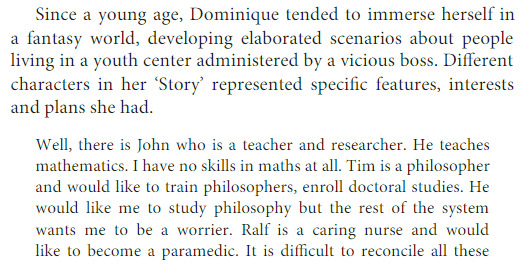
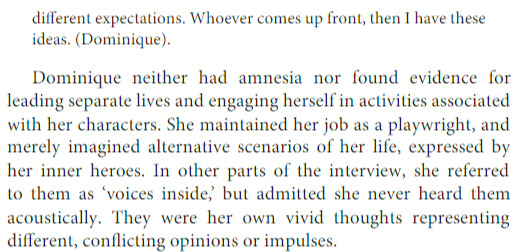
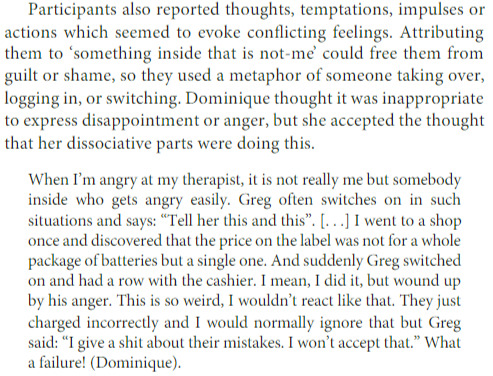
The reason for dismissing Dominique having DID is that her characters don't live separate lives or have amnesia. And it's possible she may not have it.
But what's never mentioned once in this paper is Partial DID. This paper was published after the ICD-11, and even uses the ICD-11 for its DID criteria. But the profile for Partial DID is never mentioned in the paper.
From the ICD-11
Partial dissociative identity disorder is characterised by disruption of identity in which there are two or more distinct personality states (dissociative identities) associated with marked discontinuities in the sense of self and agency. Each personality state includes its own pattern of experiencing, perceiving, conceiving, and relating to self, the body, and the environment. One personality state is dominant and normally functions in daily life, but is intruded upon by one or more non-dominant personality states (dissociative intrusions). These intrusions may be cognitive, affective, perceptual, motor, or behavioural. They are experienced as interfering with the functioning of the dominant personality state and are typically aversive. The non-dominant personality states do not recurrently take executive control of the individual’s consciousness and functioning, but there may be occasional, limited and transient episodes in which a distinct personality state assumes executive control to engage in circumscribed behaviours, such as in response to extreme emotional states or during episodes of self-harm or the reenactment of traumatic memories. The symptoms are not better explained by another mental, behavioural or neurodevelopmental disorder and are not due to the direct effects of a substance or medication on the central nervous system, including withdrawal effects, and are not due to a disease of the nervous system or a sleep-wake disorder. The symptoms result in significant impairment in personal, family, social, educational, occupational or other important areas of functioning.
This sounds a lot like what's described with Dominique.
Of course, Dominique could be a non-disordered system too.
What I find concerning is that at no point is the possibility of Partial-DID or of OSDD brought up. It's expected to be DID or nothing for the purposes of this study.
Another thing I need to say... alters aren't usually heard acoustically. I believe they can be in some cases, but it's not the majority. So I don't understand why that was relevant unless the authors misunderstand how voice hearing typically manifests.
2.2 "No participant provided evidence..."

I'm so curious what evidence people were expected to provide. As a reminder, in the last paper, being too open about talking about your alters or describing your switches was seen as a sign of Imitated DID. And it's the same in other parts of this paper.
How do you go about providing evidence for an autonomous dissociative part?
Theme 3: Exploring Personal Experiences via the Lens of Dissociation

There's not much to say about this one either. People who think they have a disorder begin relating experiences to those disorders. Like with all the other "themes" discussed, there is no comparison to the "genuine" DID group, many of whom would likely also have conducted similar research.
People who have autism, for example, will analyze their behavior and wonder how much of it is because of the autism. Same with ADHD, and various personality disorders.
Theme 4: Talking About DID Attracts Attention
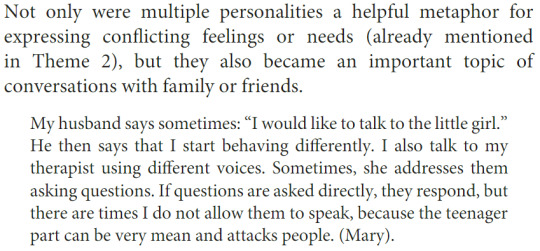
Again, no comparison is made to a "genuine DID" group who is out to friends and family. It's likely that, yes, DID is going to be a topic of conversation for those who are out. But the same is true of many conditions.
"People who are imitating DID talk about having DID" wouldn't be a helpful distinction if people who aren't imitating DID also talk about having DID. (With close friends and people they trust.)
Theme 5: Ruling Out DID Leads to Disappointment or Anger
And like with every other theme in this, there's no comparison to the "genuine" DID group.
If you lied and told the other 80 participants that they didn't have DID, how would they react???
I don't know. Because that study was never conducted.
I predict a lot of DID systems who had been diagnosed by others and identified with the label would react the same way though.
This point feels especially insidious, as it's designed to reinforce a clinicians' belief that they made the right decision after saying someone doesn't have DID.
"Well, you got upset when I told you that you didn't have this condition you're certain you had, therefore I'm even more right that you don't have it."
It can't even possibly help you diagnose because it only comes later. It's only about validating the clinicians after the fact.
All these "Themes" have the same flaw
The themes are derived from six case studies (way too small of a sample size) of so-called "imitated" DID. But there's no comparison to genuine DID. No statistics to show that these same themes wouldn't be present in a majority of "genuine" DID cases too.
In other words, these themes have zero utility in differentiating between DID and non-DID phenomena.
Return of the Shame Criterion
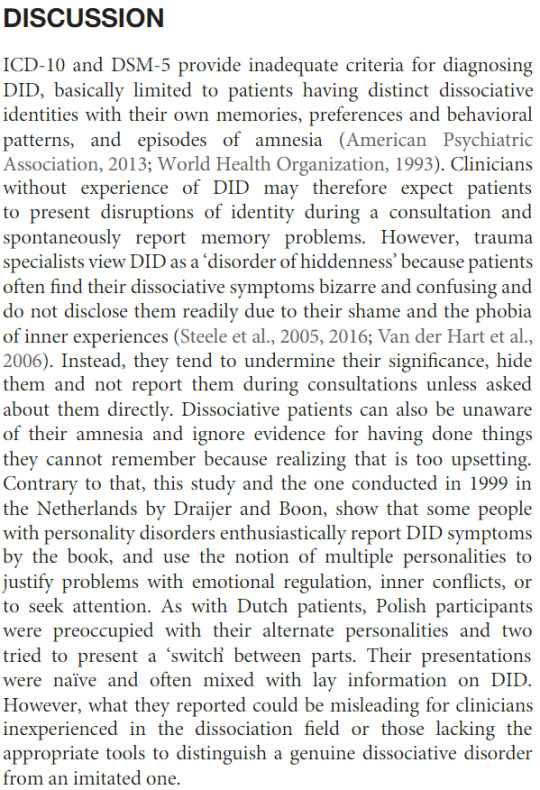
Homosexuality was much more hidden and shameful in the 80s than it is today. The same is true of transness. And the same is actually true of many mental illnesses too. We can talk about our own autism more openly than someone could in the 80s.
Shame is often not simply based on the individual but on the culture and the subcultures they exist in.
Like I addressed in the first post in this series, certain disorders, conditions and just general personality types may make someone less ashamed of traits others would be ashamed of.
But more than that, expected shame can change as a culture changes and we become more accepting. And THAT'S A GOOD THING. We should all WANT a world where people with DID can feel less ashamed of themselves. The expectation of shame, the requirement of shame to be seen as valid, is something we need to fight against.
Here's a post I made on that particular subject.
And let me just make another note on these particular patients: These are not people who had just newly been diagnosed. They've had time to heal and come to terms with what they are, and build connections with the rest of their alleged systems.
Someone who has known about their DID for three years will generally have less shame for symptoms than they might have at 1 month.
This section also appears at odds with the earlier implication that patients show evidence of "dissociative parts," creating a very unfortunate paradox where you need to provide proof, but trying to provide proof is evidence of faking.
Other symptoms of DID

Luckily, the paper doesn't just talk about themes. It also discusses symptoms. So maybe these will hold up better to scrutiny.
Voices

I'm genuinely worried by this that the doctors don't understand the internal experiences of the disorders they're diagnosing.
As far as I know, this is how voices typically present in DID. Earlier on, it mentioned that Dominique didn't report an "acoustic" quality to the voices. But that's how the voices typically work. Acoustic voices are possible too, but voices heard are typically mind voices.
The way this is phrased makes me think the doctors were expecting patients to all have vivid acoustic voices.
And I believe this misconception led to a miscommunication with Mary, who clearly is describing parts talking to her.
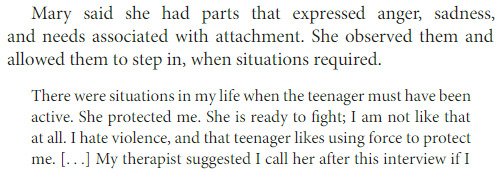

But allegedly later denied "hearing voices."
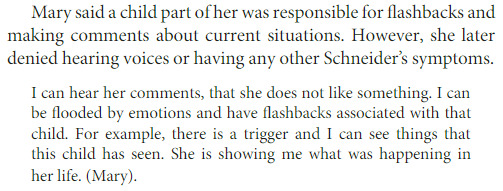
My own interpretation, at least, is that Mary was probably confused and thought the clinicians were asking about actual audible voices. Which it actually sounds like they might have been.
Voice hearing is complicated, and this paper is written in a way which might add more confusion, making readers falsely believe that alters will always speak in these sorts of acoustic voices rather than mindvoices resembling internal thoughts.
This sort of misunderstanding is genuinely dangerous to patients.
Amnesia
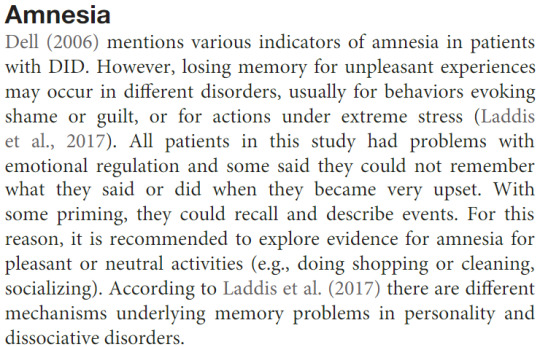
There are a couple points that need to be made about Amnesia.
First: Under the DSM, there is a presentation of OSDD that includes all the symptoms of DID but without the amnesia. In the community, we typically refer to this as OSDD-1b.
Second: Under the ICD-11, while described as "typically present," amnesia isn't even a hard requirement for a DID diagnosis as seen below:
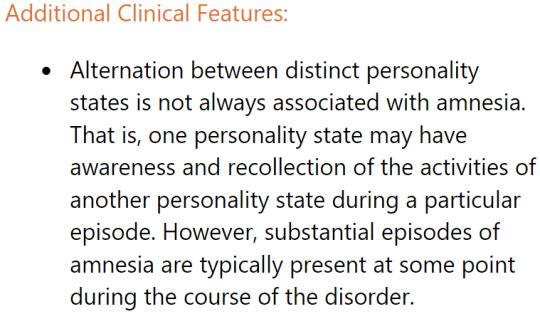
Third: Partial DID in the ICD-11 also had no amnesia feature at all. At no point is this or OSDD brought up.
Focus on the amnesia criterion here, while necessary for a diagnosis of DID under the DSM-5, doesn't address larger questions of if the patients might have disorders involving "dissociative parts."
The fact that these other disorders exist where amnesia isn't required NEEDS to be addressed this paper.
Language
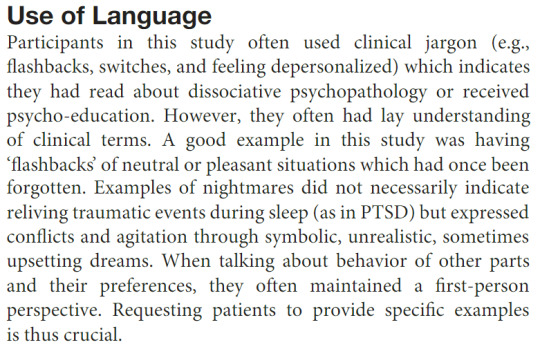
This is somewhat good advice. I'm against the implication that knowing jargon, for patients who have been told by other clinicians that they have a dissociative disorder, is an indicator of imitated DID.
But I do very much agree with the fact that people who use these terms don't often understand them and you need to ask questions that go beyond the terms selves. Getting someone to describe a flashback is more useful than them saying they have flashbacks, when they may just mean they have vivid memories.
Although for the 1st person perspective, this may just be different ways of contextualizing the same experience, or even trying to phrase things in ways they thing a singlet will understand. I think, for a paper that tries to beat people over the head with how DID is usually a "disorder of hiddenness," they're ignoring how referring to yourselves in the 1st person with other people becomes habitual.
Not to mention that certain parts of the DID community even believe it's healthier to refer to everything they do as a system using singular pronouns, viewing it as a form of system responsibility.
Depersonalization

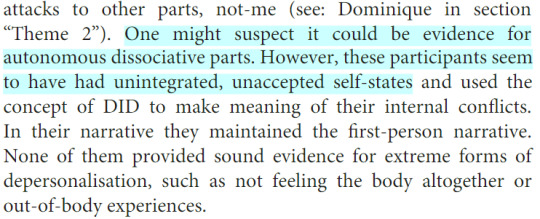
Are "self-states" not autonomous?
What... actually is the difference between an autonomous dissociative part and an autonomous unintegrated self-state with its own name and identity?
Is there a way to reliably differentiate between these concepts?
Switches
This is the part that I feel rises to actual misinformation.
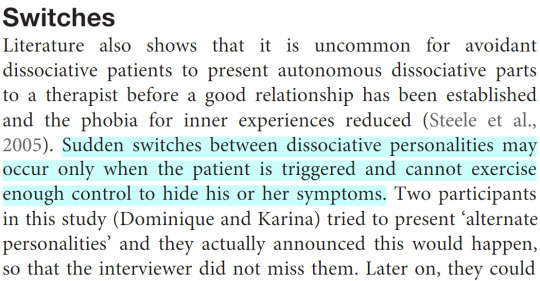
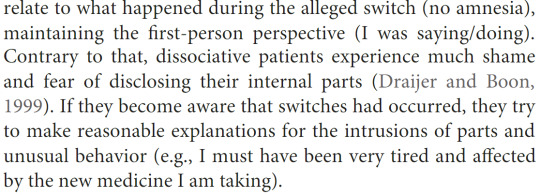
Before getting to the highlighted part, I'm going to point out that the source for the "shame and fear" of disclosing their internal parts is the study from the previous two posts.
The study THAT DIDN'T INCLUDE ANY EXAMPLES OF "GENUINE" DID CASES.
It was stated as a fact with no statistics or evidence to back it up whatsoever. And one of the authors, Suzette Boon, is also an author of this study. This "source" might as well be Suzette Boon quoting herself claiming something.
Now, to the highlighted part... this is complete misinformation.
I'm shocked it got published.
Some DID patients can, in fact, control switches. This has been observed in fMRI scans:

DID systems DO NOT need to be triggered to switch. This has been proven with actual brain scans, in addition to decades of reports in the literature.
And I need to repeat again that this group was also taken from people who were already in treatment for DID.
In other words, even if they couldn't control switching before, it would be something they likely would have picked up through treatment.
A Solution in Search of a Problem
Ultimately, this is a study which has little reason to exist. In their sample of 85 people, they found only six they claim had Imitated DID. Even if these assessments are were correct. Even if they weren't conducted by people who seem to not understand how switching or voice hearing works in DID... this would leave us with a 7% false positive rate.
Meanwhile... mentioned in this same paper...

26%-40% of DID patients will be diagnosed with and treated for Schizophrenia first. And this doesn't even address misdiagnosis of other disorders like BPD.
Imitated DID continues to be a solution in search of a problem.
But there is a very REAL problem of underdiagnosis and misdiagnosis of actual DID cases. Something that will only be exacerbated by convincing doctors that "genuine" DID systems can't possibly control switching (and anyone who does is faking), that voices heard are always acoustic, and that DID systems will always be ashamed of their symptoms.
Papers like this are going to result in fewer systems who need help being able to get a diagnosis.
#psychiatry#psychology#syscourse#plural#sysblr#system#plurality#pro endo#pro endogenic#system stuff#imitated dissociative identity disorder#multiplicity#systems#plural system#endogenic system#science#medicine#doctors#mental health#actually a system
40 notes
·
View notes
Note
Okay, so we've tried several times to write an ask, and each time we just..stop ?? So this time instead of explaining in detail n shit and saying how much we're sorry if this isn't appropriate to ask, I'm just gonna write :/
So, we're kind of stuck, in the sense that idk if I'm/we're(both pronouns feel wrong lol) a system anymore and,wdk what to do about it.
Because basically 5-6 years ago, when we were around 10(i think, but at this point i only know the story through the "telephone" of our retellings) our brain tried to just.. get rid of most of the DID. I'm not even ducking kidding, i think it tried to lower barriers and smush most of us together, to the best of it's ability. From what I've gathered, it planned on shoving all our trauma deep down in the innerworlds, and hiding them from the main kid. Like, getting rid of thousands of fragments, banking them in little crevices of our brain etc.
That procedure was supposed to make it so the main kid could have more of their life for them- without access or even knowledge of the sheer size of the abyss and pain in background, and thus being less affected by it till they were old enough to deal with it. Idk how to explain really, especially since i myself barely understand.
In any case, it went wrong. I don't know why much, as our memory has increasingly deteriorated since to the point i have nearly no knowledge left. I'm not sure even all that ever happened, because maybe I'm just inventing stuff and creating a story were there is none, and I'm scared that what i know isn't real and just my imagination or smth
And what's left is..me i guess. I kinda feel like a fragment in the sense that i have limited consciousness and just..person-space(if that makes sense ?) I'm not sure if I'm several people, one person, an eldritch entity of kinda seperate kinda not glued together entities.
Idek what i want to be. I want to be a full person, that's for sure, but other than that ? Idk. I'm lost, I'm a mix of tons of different opinions and vague, weak, feelings, and flashes of blurry memories and desires that don't belong to me.
So.. i know you probably can't help, but do you have.. any idea on what I could do ? Or if others have been in similar situations and if it got better ?
This is a very long ask x knows, and it's desperate, and you aren't our/my psychs so I shouldn't just dump this and hope you have answers, and I'm so sorry if this isn't appropriate to ask, but yeah.
I'm sorry.
Dissociative disorders do the job, but not perfectly, what you're explaining from the words of "nearly no knowledge left" sounds like retrograde amnesia, where it is near to impossible to remember anything from the past.
I also get a bit on what you mean with not knowing who you are,, that is usually close to a blurry moment? Because everything feels jumbled, its not clear, it is hard to discern wether there's multiple or not, etc. That could sound like it;
Have you been exposed to stress? Especially long term? Has anything awful been happening? Many factors can affect memory and recognizing who you are that can stem from basic needs that are neglected like sleep or rest if you're working for long periods, or deficiencies on vitamins/minerals/nutrition because they also play a part on fending off brain fog which can cause many issues like memory recall or trouble focusing,, or it can be to even deeper issues like stress as i said before, or if it is related to trauma, or any sustained physical injuries but it could be anything really.
Im guessing this is something that didn't happen in such a short time, but i do can give you some stuffs to do for starters:
Write down everything you can notice those feelings, those lingering sense of identity, or vibes, or thoughts, they are truly jumbled and it helps you organize and recognize your situation better if you have a physical record of what you're experiencing
Find the cause of problem If you can, try digging up anything you can find that could be the culprit, maybe before things get too foggy to remember that could serve as clues, and by checking with your current health (physically and mentally and emotionally) and see what could be fixed.
For sense of fulfillment It is overwhelming to know which or where you have to start from if you want to learn more of yourself, while you can do number 1 to jot down things you don't align with, this also gives you some ideas on what could be yours. Start somewhere small, like, how you like your daily morning, or preference in eating food, or the colors you think it looks cool.
It would also be great if you can leave out the tiniest bit of context next time, so my answers for now are rather vague and less pinpointed/specific. Though atleast still can suffice as a starting point to tackle your issues.
You can contact me anytime via ask box or DMs, let's see how things go for you okay?
- j
9 notes
·
View notes
Note
for the did ama, what's something you wish more people understood about did? (this can refer to singlets, people newly diagnosed, stuff that the community in general just may not know or acknowledge, etc)
i kind of share something similar to this in this ask to do with child alters if you wanted to see that
anyways there's probably a lot of angles i could go at this with but hm. i kind of hate how the online community is SO focused on alters themselves, identity alteration, like i think to a lot of people to be perceived as a Valid DID Haver you have to have alters with different names and different pronouns who act totally different from one another and that's just... not... not necessary or even common.
i took a bit to answer this because i wanted to pull up this study which has this quote, referencing some kluft research:
Many clinicians and lay people believe that DID presents with dramatic, florid personality states with obvious state transitions (switching). These florid presentations are likely based on media stereotypes, but actually occur in only about 5% of DID patients [60]. The vast majority of DID patients have subtle presentations characterized by a mixture of dissociative and PTSD symptoms embedded with other symptoms such as posttraumatic depression, substance abuse, somatoform symptoms, eating disorders, personality disorders, and self-destructive and impulsive behaviors [23, 61].
DID is a heavily covert disorder for many and while it's not unusual or even surprising that going into therapy and purposefully interacting with alters + using social media where that sort of behavior is expected/encouraged can cause us to become more "florid", many of us aren't like that... at all! and the lack of representation for people with DID who don't have super distinct alters or who simply don't want to share that information online is actually kind of appalling to me. DID is a dissociative disorder caused by childhood trauma first and foremost and comes with all the struggles related to those things. alters are just one piece of the puzzle. and the continued focus on alters harms both singlets because they don't understand DID outside of that, and people with DID... i can't tell you how many times i've talked to people with very obvious DID who thought they didn't have it because they didn't match social media depictions of the disorder. it's like everyone's trying to be like Sybil, subconsciously or not, and that's just... not always how it is!!
of course people with DID who have florid presentations are valid too and there are aspects of my DID that are very Not covert but growing up my situation was a lot more subtle and even now, there's so much about my DID people don't see because the only acceptable way to parse or talk about your symptoms and experience online are by well defined alters and the majority of our alters are just Not like that. i have so many alters that are just "me but slightly to the left" who would be hard to detect personality changes with, etc. many such cases.
tldr very good to keep in mind that people with DID are traumatized and dissociative individuals with a variety of symptoms that may or may not fall into the "idealized" standard depiction of DID on social media and in fiction, and i REALLY wish there was more discussion on the other parts of this disorder more often
#kiki was here#asks#the DID ama#mephilesthegay#i think it's easy tofall into the trap of only talking about alters#cause talking about alters can be fun!#it's like an escape from the bad of it all sometimes#and some talking about alters is good#just wish there was more balance yknow
26 notes
·
View notes
Note
I see a lot of people talk about how we (Americans) are in a cultural zeitgeist of sorts where conservatism is on the rise in young people and older beauty standards like thinness and paleness and things "old money" aesthetic and "feminine energy" and "provider men" are popularised again, and do you think we are also in a cultural zeitgeist or what do you think it's popularizing these things so rapidly in 2024?
I think I'm not totally sure what you mean by "cultural zeitgeist". To me, that phrase just means something that's generally popular at the current moment, but it seems like you're using it a bit differently here. Maybe you're asking if conservatism is the cultural zeitgeist that's causing things like changes in beauty standards and the popularization of more "traditional" gender roles, or whether it's something else?
In any case, I'll try to answer this question as best as I can, and you can tell me if I got what you were asking or if I missed the mark. In general, I think there's a lot to unpack in terms of the rise of conservatism in the US in general, why it's happening now, and how that relates to gender roles in the broad sense and aesthetics more specifically. Starting at a very high level, pretty much all political and social movements that make progress have a corresponding reactionary movement, and so it's not totally unexpected that after the US elected its first Black president and had the #metoo movement, a "return to the way things were" starts to become very attractive to people who stand to lose power in a more egalitarian society (young, white, middle/upper class, Protestant Christian, cishet, able-bodied men) or people who can be convinced that the little power they have will be taken away from them should society become more equal. Combine that with a stagnating economy, fears about immigration (and again, being "replaced" or losing social/political capital), a conservative political party that's willing to masquerade as a straight-shooting friend of the working class and that's willing to lie to get votes, a democratic political party that's been really leaning into its reputation as being made up of elitist snobs, and a literacy crisis, and it kind of makes sense how we got here.
For women specifically who are attracted to conservatism in general or more specific conservative aesthetics like homesteading or tradwife, I think there are a combination of factors that lead them to be attracted to those lifestyles. Like with the population at large, I think a disillusionment with capitalism plays a huge part in why being a tradwife is so appealing, even if they wouldn't say that themselves. I think a lot of these women have previously been underpaid at 9-5 jobs that they didn't really like or care about, and they saw that their opportunities for career advancement were still fewer than their male counterparts. So marrying a rich guy feels like less work for a better financial return, and they believe that a tradwife is what a rich guy wants (which generally isn't actually the case). I think there's a perception that life as a tradwife is slower, happier, and less pressure because that's the way it's been aestheticized (by people on social media who aren't actually tradwives because their job is social media), and in an increasingly complicated and scary world, that simplicity is really attractive. I also think a lot of women feel pressure to "do it all" - to have a high powered, full-time career plus be a perfect wife plus be a perfect, full-time mother - and opting for a tradwife lifestyle allows them to drop the expectation of having a high powered career without facing the judgement that other stay at home moms do. And for women who have struggled to find their own identity in a world of endless choices, I think being a tradwife is really attractive because all the rules of what to do and how to look, act, and be are all clearly laid out - no decision making necessary. Lastly (or at least, the last thing I can think of right now), I think in the age of content, a lot of women feel that the way they look is their biggest asset. It's easier than ever for women to monetize their bodies, whether that's in the form of being hot on social media, having an OnlyFans, or being a sugar baby. So I think there's a sense that if your body is monetizable, it might as well be sold to the highest bidder (in this case, the man who will make enough money to let you be a stay at home girlfriend/wife/mother, which is less stressful than having a job or trying to make money on social media/OF). Overall, I think women who are attracted to being a tradwife feel that the promises of feminism only created more problems for them (an expectation of a full-time job plus being a full-time mother, an expectation of being both classy and sexually free, etc), and so a return to a pre-feminist era is preferable in their minds. There's more to say on this, but I'm trying to keep this from becoming too long, so if you're interested, there are some good articles on this topic here and here.
And then on both sides, I think there's some anxiety about gender identity that's playing out in the "feminine energy"/"provider men" space. As a culture, I think we have been moving towards this idea that gender is more complicated than we originally thought. Is it biological? Psychological? Social? Some combination of all of those? Is it binary or a spectrum? What does it mean to "be a man" or "be a woman" in our current society, and how are those different from one another? I think that complexity makes some people uncomfortable, especially when they view their gender as a core part of their identity. So the idea of "feminine energy" and "masculine energy", both of which come with clear expectations and roles, is a simple way for people to quell that anxiety and to not have to think about it any further.
So then, how does that desire to "return to the way things were" interact with aesthetics? I think the aesthetics of conservatism are inextricably linked with the desire to rid one's self of anything that would make them seem like the "other", and so on the flip side, there's a real desire to conform as carefully as possible. This is where things like the "old money" aesthetic come in - if you're perfectly signalling that you come from generational wealth, nobody will ever mistake you for being poor or an immigrant or non-white or LGBTQ+ or a feminist or someone disabled or any other group that (in our cultural imagination of the past) didn't exist in the US before 1950.
Finally, to answer why this is happening so rapidly, I think it's just social media algorithms. The more people respond to something, whether positively or negatively, the more of that content they're shown, and the further they get pushed down that rabbit hole. And because of that, trends can spread way faster than they used to be able to, and trends can seem way more popular than they actually are if that's all your algorithm is showing you.
I'm sure there's some other stuff I'm forgetting to mention, but I'll stop here because this is getting sort of long. Hopefully that answer was at least in the realm that you were hoping for 😭 But if not, of course feel free to send me another message. I think this is a really interesting conversation so I'd love to keep chatting about it.
5 notes
·
View notes
Note
If you have the energy I’d like to hear you talk abt what you value in atheism as a belief system! (This is meant positively I’m just bad at Words, if the question puts you on the spot then no pressure to answer!)
Hello!! Yes!
I think "belief system" is maybe the wrong word- imo, a big part of what makes atheism what it is is that there isn't any kind of organization, there's no system, and the only "requirements" are... well, ultimately just that you call yourself an atheist.
I've seen a ton of different ways to define the word, and a ton of different people call themselves that- or something else- for different reasons; my point just being that it's a really diverse, really complex label, and ultimately I think it works about the same way queer identity labels do: you decide if it applies to you, and if you decide it does, then it does! There's nobody to tell you whether you're right or wrong about that; that's sort of the whole point.
I grew up atheist, and aside from a couple of edge cases I learned about in my 20's, my known extended family is entirely non-religious. I say "three generations of atheists" because I recall one great-grandma who had some angel-related paraphernalia and I don't really remember her deal about it, and because "atheist" is a close enough shorthand; some of my family would probably rather describe themselves as "agnostic", but their reasoning, when I've asked, is largely that they think "atheist" means "anti-theist".
I also say that because my experience in learning about religion has been... kind of unique. I live in an area that is 60% non-religious; I think a good amount of that is that people who grew up with some Christian influence in their life decided not to pursue it themselves. Still, it's not super common to talk about religion here, and religious influences- while they still very much exist- aren't really named for what they are.
What that means is, essentially, that I absorbed a lot of values and ideas as a kind that came completely detached from any reasoning. And I'm a painfully introspective (read: anxious) person; I spent a lot of time reflecting on those values from a very young age, and I was encouraged to do so, in many ways, by the adults around me.
I distinctly remember being about 10 years old, in a car with my mom and stepdad, and wondering about why people Did Good Things. Was it selfish- because it made them feel good? What motivation was there to be charitable and generous, if not for some kind of reward? I knew I wanted to do good, and I knew that part of that was internal satisfaction, but that didn't feel right as an answer. I decided later that this was a function of human nature, to help each other- and even if it was an evolutionary community-building thing, doing good was also a way of building a happy, sustainable life with full and healthy relationships.
I have never understood the "what is the purpose of life?" question- it's been pretty obvious to me from a young age that there isn't one, and there doesn't need to be. We weren't "put on the planet" in the first place. We're here because of a beautiful string of semi-random events, and we get to decide what to do with the opportunities and hardships that comes with.
When I was 12, I decided, on a walk home from school, that my "goal" in life was going to be to be the best person I possibly could. I have spent a lot of time since then working out what that really means; along the way, I realized that in order to do this, I also needed to be a happy person. I needed to heal and grow and live a sustainable life, and I needed to value myself and my inherent worth.
This is a lot of rambling to say, essentially: I think atheism means different things to different people, but I think the idea that it's some kind of void of experience and value is plainly ignorant and genuinely damaging.
This is just a snapshot of the ways in which I currently recognize atheism to have influenced my life, and there's a lot more I could touch on as well! But the idea that we choose what's important is core to a lot of atheism, I think; and there is a genuinely beautiful value system that follows from this.
I choose what's important to me, and others choose the same for themselves. I choose my goals and "purpose", and others do the same for themselves. In a lot of ways, that heterogeneity is part of what makes communities work: understanding and appreciating differences in value systems and worldviews means including more and more of what each individual has to offer.
None of this is exclusive or universal to atheism (and again, the label itself is pretty broad depending on who you talk to) but it's an example of the ideas that can follow from certain questions pretty inherent to the idea that there isn't a higher power.
64 notes
·
View notes
Text
Polish Versus Ukrainian Cuisine, Part 1
I have to confess, I have a little sin on my consciousness, namely, I visit Instagram sometimes. In most cases I do that just to catch up with my friends and family, but, you know, as most of young people of my age I just end up scrolling a tiny bit (usually, right until the moment I feel the urge to vomit, as I genuinely hate this place).
Recently, I came across a very cozy video where a Korean home cook mixes a Polish Pierogi Ruskie recipe with some Korean toppings. The thing that confused me the most, though, was the most liked comment under this video left by a Ukrainian woman who claimed that Pierogi Ruskie is a Ukrainian dish and is, in fact, called Varenyky. It's easy to assume that this person has never made a single dumpling, varenyk or pieróg in her entire life, as she kept on claiming that Pierogi Ruskie can have a lot of different fillings and that Polish Pierogi don't have such a big choice of fillings as Ukrainian Varenyky do, so, clearly, this person had zero idea what Pierogi Ruskie actually are, but that's not the point.
This comment made me wonder how different are the two cuisines of those Eastern and Central European countries. Having lived for a long time in both countries, I thought it would be interesting to study this topic a little bit, namely from the perspective of the difference between the staple dishes in two cuisines. After all, we actually are what we eat, especially on the global scale. Everyone knows Italy for their brilliant pizza and pasta, and everyone knows Japan for sushi and tempura, and even though food is not the only aspect of those cultures that made them famous around the world, it definitely adds up to create a full picture of their collective cultural identity.
So, in this post I'd like to share some personal observations that I made throughout my life about Polish and Ukrainian cuisine having lived significant portions of life in both countries, being ethnically related to both and being wholeheartedly fascinated by food.
Disclaimer!!! I'm not a food scientist or chef, nor am I a professional historian. All the notes down here are mostly based on my personal observations and some basic research. I did consult a professional cook and a baker whom I know personally as they happen to be my family members. I do recommend treating everything I share here with a grain of salt (hehe, because we gonna talk 'bout cookin', hehe, so use salt) and bear in mind that different cooks have different approaches to their recipes and your personal experience with Ukrainian and Polish food might differ from mine. That being said, I encourage you to share these experiences whether you are Ukrainian, Polish or anyone else, really. I do not accept such arguments as "Ruskie because Kyiv Rus!", though, as it's not about arguing in the first place, it's about diving into the heritage of those two countries and talking about the food.
Pierogi vs. Вареники


Let's start with them culprits. I think those two dishes are the most confusing ones because of their similarity. Gosh, both of them are dumplings from Europe shaped like a growing moon, aren't they?
The dough for both dishes varies from region to region, from cook to cook. In my experience, both recipes need three basic ingredients:
- liquid
- salt
- flour
The rest depends, really. You can change the four, you can change the liquid, replacing water with milk or kefir, you can add an egg. I personally go with my mother's recipe which is boiling hot water, egg, AP flour and salt.
Two of the striking differences are their size and shape. It seems like Ukrainian dumplings are usually smaller, flatter and quite translucent in comparison to Polish ones, which are big, sometimes even huge (check Pierogi Po Bieszczadzku, they are bigger than my fists, I kid you not), they have a very full body and the dough itself is thicker (the reason is not so much ingredients in the dough as is the method of forming/cutting the circles out of it). They also have a lot of different really funny regional names which very often also refer to the size, shape, filling or method of preparation, for instance, Dzyndzałki (Warmian small dumplings served in soup), Bulwanki (Eastern Polish holiday pierogi with variety of savoury fillings), Sasznie (A type of dumplings from Eastern Borderlands that use potato in the dough) or Sójki (Masovian baked pierogi made with yeast).
The fillings of both Pierogi and Varenyky basically might create their own multiverse. In both Poland and Ukraine, I found so many different combinations of fillings that it would be a waste of time to write about each one of them. However, Pierogi most often have savoury fillings (from meat through cheese and potatoes though different types of groats and the list goes on and on..), while Varenyky have a bigger variety of sweet fillings, including the classic cherry filling. Also, Ukrainians seem to be not very much into the meat filling. In my childhood, I had never eaten meat dumplings in Ukraine, however, at the time, pelmeni were quite a popular alternative. Ah, classic Soviet influence - replace your own with something russian )yuck.
As for the toppings, depending on what kind of filling you are dealing with, there are many alternatives for both dishes, including chives, fried bacon, sour cream, melted butter, caramel sauce (haven't seen this one in Ukraine, but noticed it being popular in Poland with sweet cottage cheese Pierogi) and many others. Both dishes are absolutely marvelous even without any additions.
Now, if anyone says that Pierogi Ruskie are called that way because they are Ukrainian, they are not entirely wrong. This type of pierogi was invented in Eastern Galicia (a geographical region in Western Ukraine which was also used to refer to the Eastern part of Poland; The name derives from its Polish name of territory - "Ruś Czerwona" ("Ruthenia Rubra" in Latin)), however there's a high chance it happened when it was the part of Austrian Empire, when majority of population in this region, especially in big cities including Lviv, were Polish. Either way, this dish is much more popular in modern Poland and has lots of different regional variations that you can meet across the whole country (see the Bryndzylki designed by Polish Highlanders), while it's basically non-existent in Ukraine and in the country they are often called "польські пироги" (literally "Polish Pierogi"). Pierogi Ruskie are prepared with cheese, onion and potato filling, while in Ukraine you are more likely to come across some Varenyky with potato, onion and bacon filling.
Thank you very much for your attention, share your dumpling preferences and experiences in the comments or in the reblogs, share your recipes, go crazy, and let's discuss the food!!
My pierogi variation with cottage cheese and strawberry jam filling (not the most attractively shaped one, but very tasty - my significant other approved them):
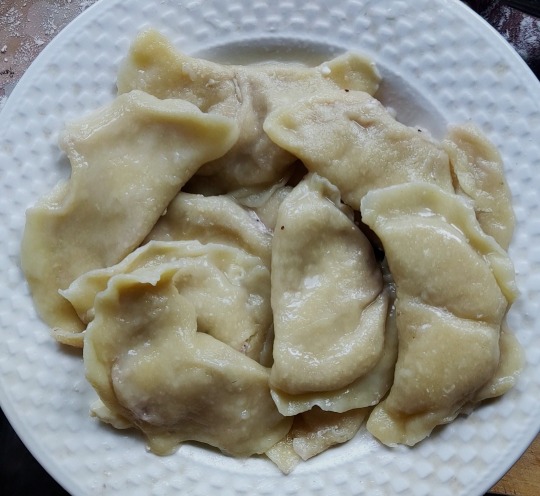
#poland#ukraine#pierogi#varenyky#polish cuisine#ukrainian cuisine#polish culture#ukrainian culture#dumplings#cultural differences#culturalheritage#culturalexploration#polska#polska tradycja#polish tumblr
13 notes
·
View notes
Text
i think FLCL Shoegaze is like, simultaneously good and bad for all the reasons that made Alternative actually good
Alternative is really good and i'll die on that hill forever. at one point i used to like it more than the original and while that isn't the case anymore for now maybe i'll go back once i rewatch Alternative i still hold it in very high regard and i think what makes Alternative so good is that it's capable of standing on its own. if you were to remove all the FLCL stuff from it, make it a 13 episode anime and make everything with Pets the mid-series and focus on building from there, it could've made it as it's own IP. it was part of the FLCL universe, yes, but it was also not afraid to do its own thing. Alternative was capable of having its own identity beyond "it's an FLCL sequel" with it's own personality
in that sense, it makes sense that Shoegaze, which is a direct sequel and even has the same director is the same, but it doesn't... have enough episodes, tbh? like there's one ep yet, so there's still a chance at revealing stuff but... i dunno. it's already over, basically.
more chances to see Harumi and Masaki bond as they climb up the tower, maybe meeting new people as they continue to climb up as the side character of the week and robots along the way: it's like... a big part of FLCL is bonds. it's a coming-of-age story, and part of growing up is understanding the bonds you have, and sometimes recognizing the ones you have aren't healthy.
it feels gone here. the most development we've gotten was more related to Kana, a character from the last generation and what she was up to after Alternative. it's like we're already at the ending when it just started, like the characters just took one big step to get there instead of watching it develop. Grunge, for my issues with it, had a larger cast of characters that we got to see the adventures of over 3 episodes... and 1/3 of these episodes mostly focusing on Kana, who already had 6 episodes to develop.
i dunno. Shoegaze also isn't afraid to do it's own thing. i just... i feel like it's over when it feels like it's just begun. we still have one ep left, but i can't help feel like: i want four more episodes, not one, you know? and the lack of those bonds has really hurt my enjoyment of Shoegaze. it's good for all the reasons Alternative is, but doesn't have the time to actually flesh any of those things out, so it falls flat. i feel like Harumi is a character i'd normally love, but all i feel myself caring about is seeing more Kana because of how this show has gone. ever since it started airing, i started realizing whenever i think about Shoegaze i just really think about more Kana, who's a great character, as opposed to the underdeveloped main characters
anyone else feel the same? i'm curious
#flcl#flcl alternative#flcl shoegaze#kana koumoto#masaki aofuji#harumi araishu#toonami#adult swim#starposts
14 notes
·
View notes
Text
for a while I've been struggling real hard to convey what exactly I want in coming up with original species that contain everything I like about SU Gems and Transformers in general without just copy pasting them so here's the stuff I specifically want with Gems in particular:
The way projection bodies work and how they have massive shapeshifting capability. This is of the most fun parts of Gems; arguably, its the most iconic aspect of them and certainly the bit that sticks out the most. In fact I'd even argue their shapeshifting is the most fun aspect that really invokes the most potential. When I think about Gem OCs or tihngs based on them, the way gems can transform themselves and modify their projections based on needs or aesthetics is by FAR the single most relevant bit; everything else is honestly secondary, to the point that making it work easier is the core part of it. So something that is functionally a solid magic mass that can be modified at will is the key part here. (So the same thing can be accomplished if they're actually made of a quasi-organic smart material mesh, or some kind of programmable matter. What matters is the result!!)
The flip side to this is that them being living gemstones is actually secondary, and honestly not particularly relevant. For example, making them elementals of living stone or gem is completely irrelevant to what I want them to be; its more important that their bodies can transform instead of them being made of living minerals.
Instead, what's more important is that they have something akin to the heart drive; that is, the core of their being or their central processor that can be removed or inserted into other objects to varying results, such as them then able to use that device as a new body or merge with its intelligences in some way. This is VERY important; a key aspect of what makes Gems so fascinating to me is that they are alien robots created for specific purposes and can choose to be defined by that purpose or not. What matters here is that they have a drive or core that is their only real organ, and that they're PROBABLY artificial in nature. At the very least, they're created to perform functions, though they might not have outright castes as canon Gems do.
Fusion as an inherent capability? Honestly this is negotiable. Fusion in various ways is a common magical technique in my setting, so this doesn't have to be something inherent to them. It CAN be, if a good idea comes up (for example, their drives are naturally able to link together with other ones, forming a gestalt, and studying this leads to the fusion technique for others.)
approaches to gender; I'm honestly kind of flexible about this. While I like the Gems functionally being a monogendered species in canon, I'm honestly somewhat indifferent to that being the case here. Given the plasticity of their bodies, it might work just fine to have them take on gender identities based on the attitudes of other cultures that resonate with them.
Connection to robot kindred? That last point is also how I imagine Transformers work. So this begs a question; the heart drive is VERY similar to the Spark of Transformers. So should these be different species or the same sort of being? That perhaps they can be plugged into a exoskeleton robot frame and that's thier new body, with advantages and disadvantages related to it? Could someone be modifed to become an entity similar to these beings, or instead of being a species, in general other people are modified to become like these beings, something like Age of Sigmar's Stormcast Eternals?
The weapon summoning thing. Yeah I actually don't care much about this, apart from potentially being a shapeshifting application. That could instead by a common magical technique. In this case, those weapons aren't a part of their bodies, but an actual weapon made and modified and then attuned to their bodies so they can summon it at will, and so can anyone else who cares to try.
4 notes
·
View notes